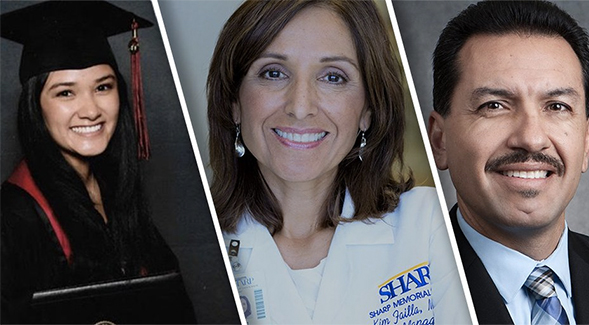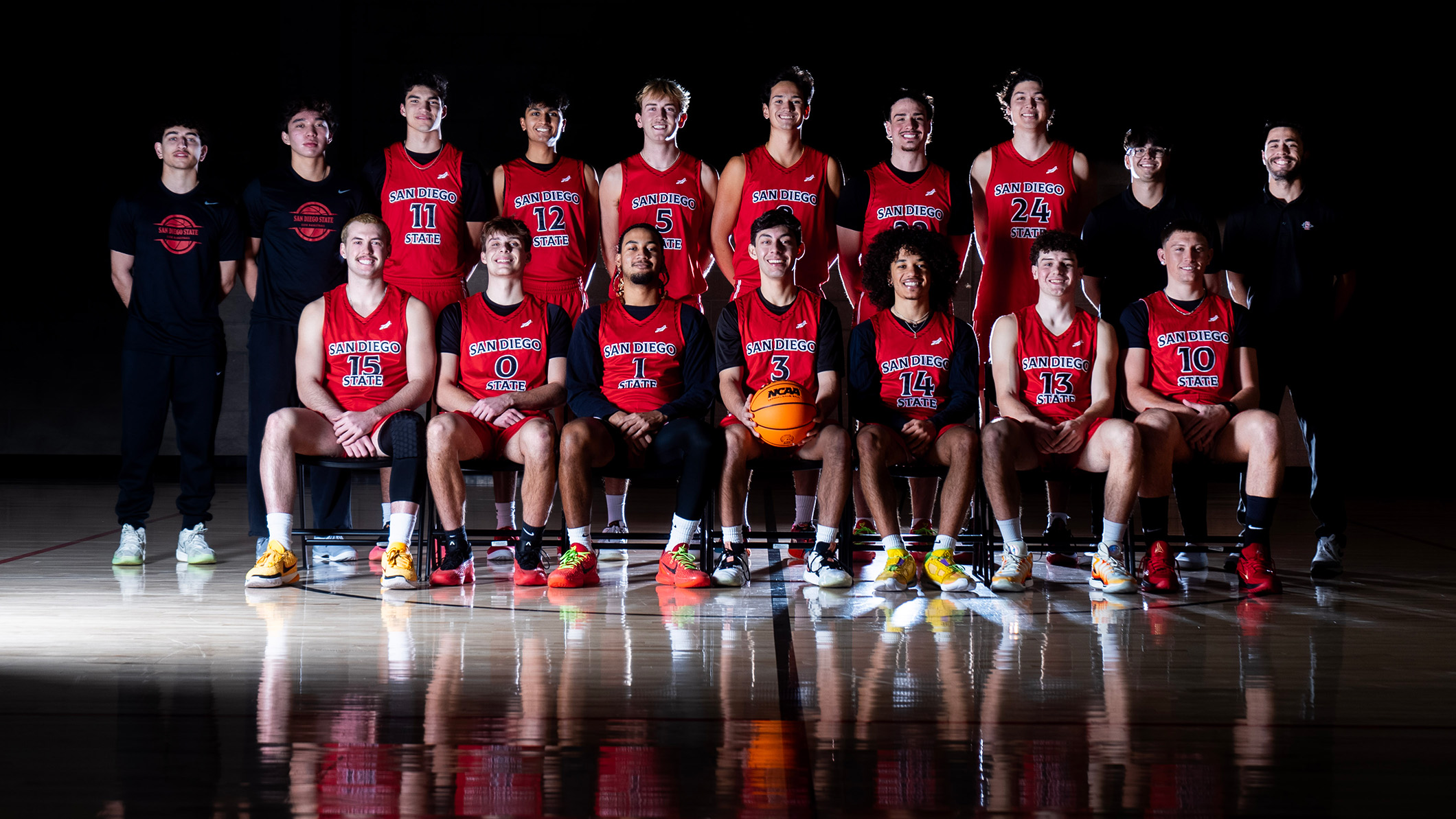Leading the Fight Against COVID-19
Thousands of SDSU alumni are on the frontlines helping to fight COVID-19. Here are the personal stories of three alumni.

Thousands of graduates of San Diego State University’s College of Health and Human Services (CHHS) now face what may be the challenge of a lifetime: a global pandemic. The magnitude of the novel coronavirus, COVID-19, is placing extraordinary demands on the international health care community.
While large-scale accidentsand disasters have always confronted the health care professions, overcoming COVID-19 will require selfless dedication, sacrifice, and innovative cooperation. In interviews, three SDSU alumni shared what they are doing to help their communities cope with the coronavirus and how their educations helped prepare them.
Alana Lucas (’19), Medical and Surgical ICU Nurse
Barely a year ago, Alana Lucas (’19) was preparing for finals while looking forward to commencement and a career. Now she is a medical and surgical ICU nurse at Sharp Chula Vista Medical Center, where much of the ICU is being converted into “airborne rooms” to accommodate an expected influx of patients infected with the coronavirus.
“It’s been pretty hectic,” said Lucas, who started her job last August. “On top of my being new to the profession, all of a sudden there’s a pandemic, so it’s been a big learning curve, but my colleagues and our management have been very supportive.”
She understands the risks to patients and medical staff posed by the aggressive disease, but Lucas trusts her training, colleagues, and managers. “I’m happy how fast my hospital has enforced (policies and procedures) and makes us feel protected; I feel like we’re prepared.”
Her SDSU School of Nursing education is part of her preparation. Lucas recalls a rigorous curriculum taught by instructors who would assign projects designed to promote critical thinking.
“They really wanted you to think about things in the real world,“ she said. She remembers lessons she learned in a critical care class taught by Assistant Professor and Graduate Advisor Beverly Carlson (’95).
“Dr. Carlson was amazing. Anything I’m about to do, I picture her lectures in my head and try to incorporate that with what I’m learning now.”
Being from San Diego, Lucas said it’s heartwarming to know I’m helping my community.
“Along with all the other nurses, it feels good knowing that I can contribute.”
Rigoberto Vargas (’93), Ventura County Public Health Director
Ventura County Public Health Director Rigoberto Vargas (’93) has an understated evaluation of the current COVID-19 era: “Interesting times.”
It keeps with his administrative philosophy of leading by example. He is encouraging, yet realistic, and having grown up in Ventura County he takes personally his responsibility to protect the health and well-being of its citizens.
Accordingly, he strives to direct his department’s 350 employees and $45 million annual budget in the most efficient and effective ways possible to combat the coronavirus.
“It has been challenging not because we have the largest number of cases or anything like that, but because of the unprecedented nature and enormity of the situation from a global scale to a national and local scale. At the same time, as challenging as it is, it’s also rewarding to be at the forefront of trying to mitigate the situation.“
As a student working on his master’s degree in public health, Vargas never imagined himself in such a position. “I thought I was going to be more of a community health promotion specialist – a health educator,” he said.
“But taking health administration courses and the variety of courses that come with a master’s degree in public heath opened doors for me.”
At the recommendation of his professors, Vargas developed skills in grant writing that have served him well. He said his agency depends on 90% of its funding from grants which pay for programs and positions it would otherwise lack.
“Having a master’s degree in public health has been a blessing for me in my career because without it I definitely never would have gotten to where I am now,“ said Vargas, who has worked at the agency for 22 years and been its director for seven. Now, he is counting on his training and experience to help him serve his community like never before.
“This is a resilient county in a resilient state and nation,” he said. “We’re a team and at the end of the day I think we are still going to come out of this situation okay. We’re going to survive.
Kim Reina Failla (’98, ’07), Nursing Workforce Transitions Director
As Nursing Workforce Transitions director at San Diego-based Sharp HealthCare, Kim Reina Failla (’98, ’07), oversees systemwide initiatives including nurse residency programs, preceptor programs, and the mentor program. Since the COVID-19 outbreak, her responsibilities have shifted.
“In a sense, my job has been somewhat repurposed to help out with day-to-day decision making, day-to-day operations of how to handle everything from new admits to testing to the labor pool,” she said. “I’m devoting more time to what’s happening in our world.”
Reina Failla is part of Sharp’s incident command system which she describes as a “well-oiled machine” designed to respond to crises. As a former neonatal ICU nurse now in a formal leadership role, she brings the perspective of direct caregivers to the table when policies and strategies are discussed.
“We do bring our front-line leaders in for decision making, but as a formal leader you really can influence decisions that affect caregivers,” she said. “I love the opportunity to be that person, to be that influencer, to help make things better.
Reina Failla credits SDSU with helping to launch her career. “San Diego State has such beautiful relationships with the different hospitals in San Diego that I was placed almost immediately into the Sharp HealthCare system as a nursing student.
“They respected San Diego State so it was like you were ushered into an arena where you were welcome because of the program’s reputation. Had it not been for that beautiful relationship, that would not have been possible.”
For all the uncertainties of the current pandemic, there is one part of Reina Failla’s job in the incident command center she particularly enjoys: calling discharged patients with negative coronavirus test results.
“To be able to say, ‘Hey, I want to give you some good news’ has been so satisfying. To tell somebody they tested negative is really incredible.“



